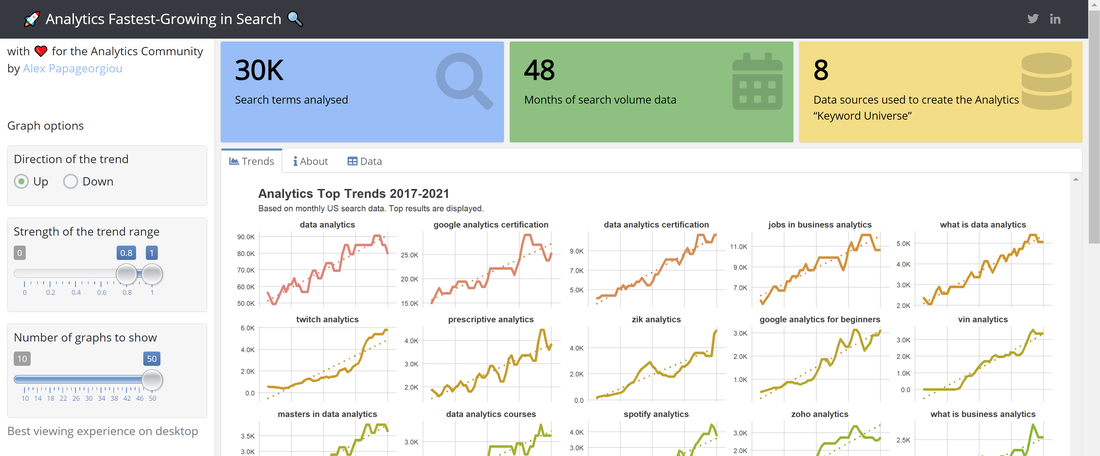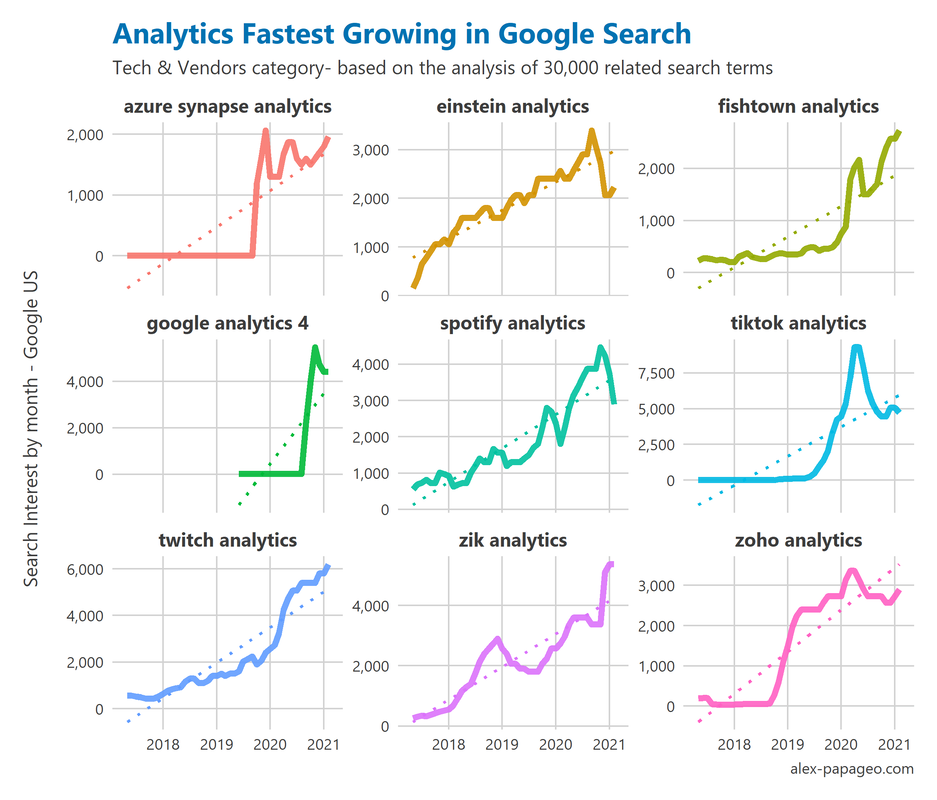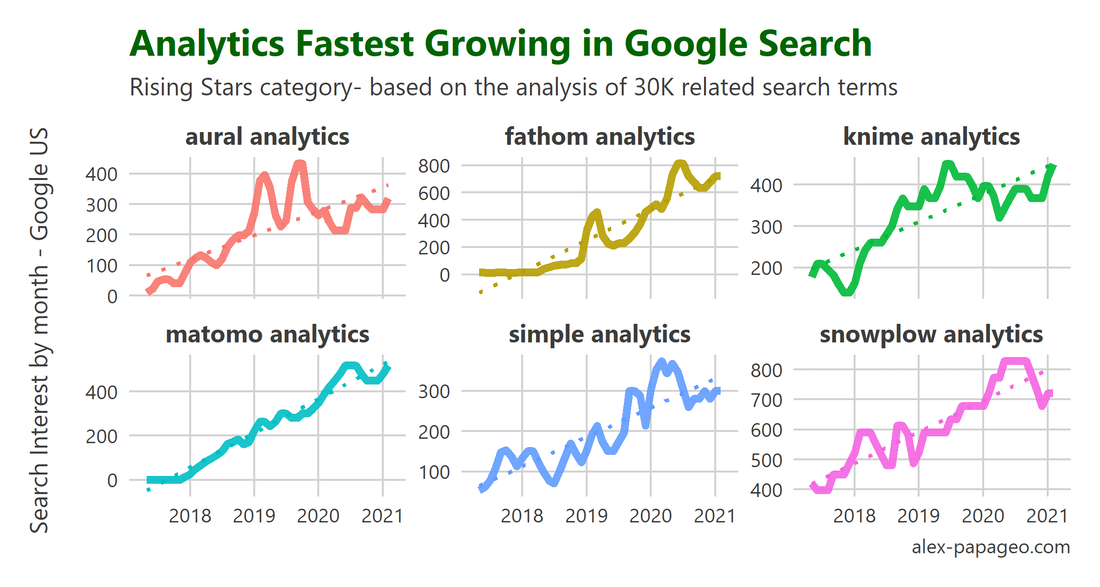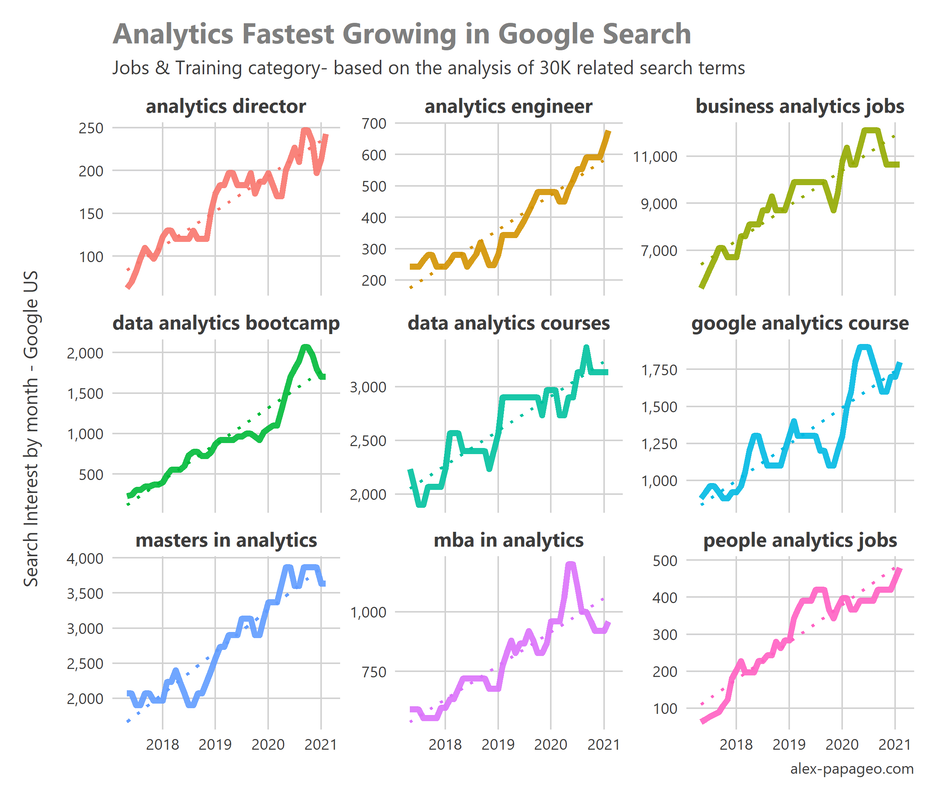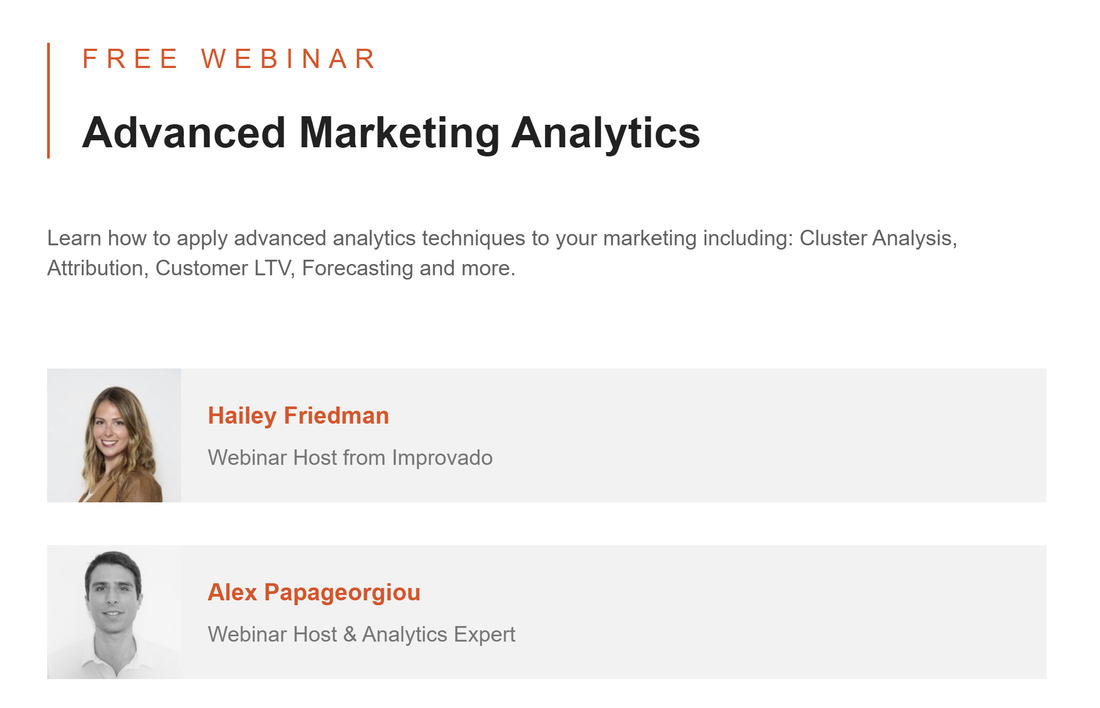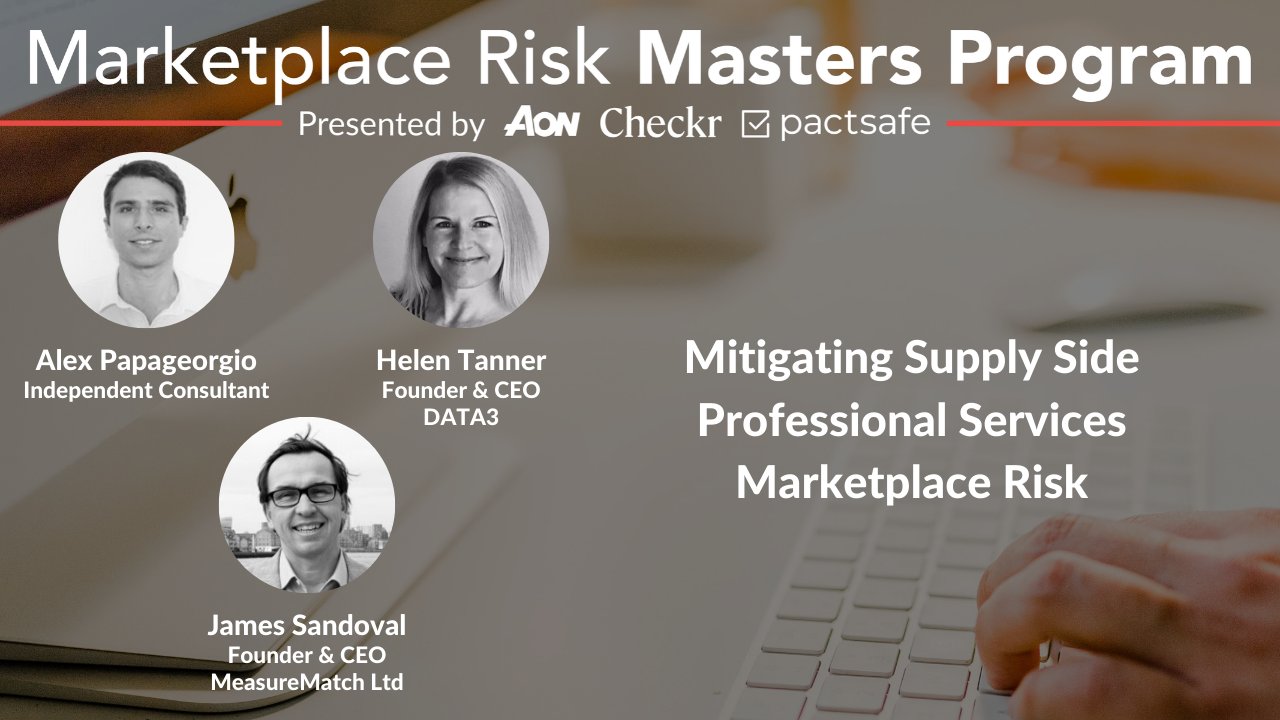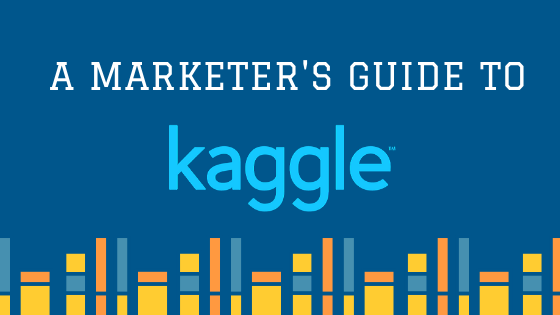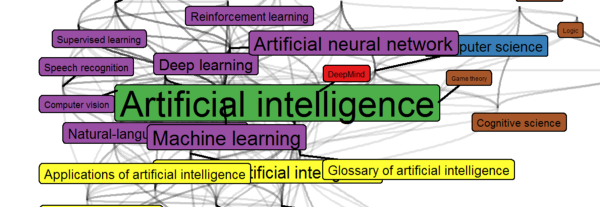|
At the most recent Xoogler.Co solopreneurs & freelancers event I had the pleasure of hosting Marina Glazman, an entrepreneur, content strategist and former Wall Street Journal strategist.
Over 50 Xoogler solopreneurs, entrepreneurs and founders attended her talk on how to get published in top-tier business outlets without PR. Marina was an ideal speaker to cover the topic as her work has been published in outlets such as Business Insider, Fast Company, Harvard Business Review, Entrepreneur and Crunchbase among many others.
0 Comments
I've published a web app to capture the top analytics industry trends. You can use it to explore and visualise 100s among the fastest growing trends, based on search interest over time on Google. https://analyticstrends.app So, why use search data for an app of this type? -Consumer behaviour is evolving fast during these times. -Tracking and analysing it though is becoming more complicated with all the new privacy constraints. -Search data is an alternative data source for marketers, which can shed light on what's inside the searchers' minds collectively and not as individuals. This version of the app focuses on the analytics space, but this type of analysis is applicable to any other market, service or product. The benefits of search data go beyond SEO-focused keyword research. It is a valuable resource for both market and product research, too. In fact, it can even be integrated into all research types and intelligence analyses where listening to and decoding the consumer’s voice plays an important role. I’ll explain how this is possible through an example focused on the analytics industry. I will also discuss 6 reasons why search data can be used as a key source of insight at the strategy level. Some Background This research was inspired by Krista Seiden’s 2020 talk at Xoogler.co on key trends in the analytics industry with a particular focus on the various technology stacks. Krista didn’t use search data, instead her talk was based on data she had collected by conducting her own research. She surveyed a large sample of individuals who work in the analytics industry. Understanding these trends is part of my work as a consultant, so I have a natural interest in them. Given my work in the analytics industry and my interest in exploring what’s next in this space, I felt inclined to contribute to this line of work by following a similarly data-driven approach. Why Search Data It would have been practically impossible for me to reach the number of analytics professionals Krista had in her study, so I decided instead to use publicly available search data and see if any noteworthy trends would emerge. At that point in time I was actually already thinking about the potential benefit of this type of analysis — but for a different reason. Covid-19 was at its peak, and it was becoming obvious that the pandemic was strongly impacting consumer behaviour. Finding ways to look closer at how consumers search for products online and which new search patterns are emerging could offer useful insights. Moreover with increasing barriers in the tracking of user behaviour, any additional data sources that echo the consumer's voice, become highly useful. I hypothesised that search data could also provide another complementary angle to the original analytics trends research. So, I set out to collect search query lists and analyse keyword search volumes. The Analytics Trends Research Method I created and data-mined a keyword universe for Analytics, looking for the fastest-growing trends. The method deployed was as follows.
3 Trends in the Analytics Industry Based on Search Data A number of noteworthy findings naturally emerged from this analysis, which gives a good indication of the insights that search analysis can produce. I will briefly discuss three of them below. If you are interested in exploring the trends yourself, check out the web app https://analyticstrends.app 1. Fastest-rising analytics tech and vendors These are the fastest-growing analytics tools, technology and vendors in mainstream analytics tech. Some of the tools, like Einstein and Spotify analytics, have grown in very consistent ways over the course of the last four years. Others, like Google Analytics 4, follow a hockey stick curve. It’s often worth looking at the causes of the specific search behaviour for the various topics — in Google Analytics 4, for example, the surge in search interest was the result of a new product announcement. On the other hand, Fishtown Analytics (another term with close-to-meteoric rise) released a popular open-source tool that contributed to its rapid growth. 2. Rising stars in analytics It’s easy to keep the focus only on the terms and topics that have the largest volumes of traffic. However, valuable insights can be found anywhere within the keyword universe. A number of analytics software vendors — in some cases, we could think of them as niche players — have grown very consistently, even though some literally started from zero. An interesting insight is that three out of the six vendors in the graph belong to the category of ‘privacy-first’ analytics, which seems to be a reaction to all the privacy legislation and discussions that followed over the course of the last few years. It is a strong signal that the new privacy landscape can create significant opportunities for new players in the analytics space. Matomo, Fathom and Simple Analytics have exhibited fast and consistent growth while being vocal about privacy protection and their commitments to it. 3. Fastest-growing terms in Analytics jobs and training This last trend illustrates the increasing demand for analytics-related roles, such as analytics engineers and analytics directors. Demand for specialised roles is followed by strong demand for training and courses that qualify professionals to work in these roles. The high demand for analytics jobs and education is not a surprise in itself, but the pace of growth is quite impressive — look at the rise of search interest for analytics engineers and analytics bootcamps. Search Data: Going from Tactical to Strategic I’ve used search and keyword data for a long time, mainly working with it from a tactical standpoint for keyword bidding, ROAS calculations, keyword rank tracking and keyword research for SEO purposes. While working on this analysis, it became obvious to me that search data can play a strategic role when making business decisions involving products, markets and consumers. The analysis above only scratches the surface, there is so much more to be explored when the terms within a ‘keyword universe’ start to be grouped or clustered based on their semantic, lexicographical or other case-specific attributes. I have prioritised the use and analysis of search data in my work since the analytics trends study. Below, you’ll find several ideas on how to use search data strategically in your organisation. 6 Ways to Use Search Data Strategically in Your Organisation 1. Use it to observe the bigger picture of what’s changing in an industry. The example in this article comes from the analytics industry, but it could be any other industry or market. Search data analytics can be useful in identifying rising or declining search interest in products, markets or topics, while also helping businesses understand the specific patterns in which the change unrolls. Some terms, for example, can have a meteoric rise and fall compared to others that grow slowly but surely over time. Understanding these patterns is essential when deciding whether to invest in a new product or market for the long term or take advantage of short-term opportunities, i.e. marketing campaigns that focus temporarily on topics that spike in search interest for just a short time. 2. Analyse search data to identify emerging business opportunities. For example, detecting high demand from specific locations could be a good reason to examine the potential to enter a new market. If you are already considering expanding, it can help you mitigate risk once you know there is a guaranteed level of demand. Search data can also be valuable when calculating the potential size of a market of interest in terms of search demand and provide estimates about the level of competition and search market share. By examining and combining these trends, you can capture high-potential business opportunities before your competitors, come up with new product ideas or identify opportunities early on, positioning your organisation for a first-mover advantage. 3. Search data analytics can focus on existing markets and products too. It can enable companies to understand the language that consumers are using to look for or describe their specific products and services. This is particularly beneficial for startups because it requires significantly less investment than other primary market research forms, for example, involving focus groups, surveys of population samples, etc. Moreover, it can be performed and delivered in a much shorter time frame. ‘If you’re trying to persuade people to do something or buy something, it seems to me you should use their language, the language they use every day, the language in which they think.’— David Ogilvy 4.Understand demand composition and anticipate future demand. This could be particularly useful for e-commerce businesses. Understanding the seasonality for certain products and generally the level of demand and where it comes from can help in many ways: from better planning of logistics and managing the stock to better controlling the timing and intensity of marketing campaigns as well as prioritising product promotions within those campaigns. The remaining two in this list of six illustrate the importance of search data in 2021 and beyond. 5. Understand Covid-19 impact on consumer behaviour. The pandemic has dramatically impacted our lives, and this has no doubt changed the ways we research and purchase products and services. Many of these changes are expected to continue. Detecting these changes as they happen and getting a deeper understanding of what’s behind these new trends is another use case of search data analysis. In fact, in many cases, these changes inspire businesses and entrepreneurs to create new products and services or find new ways to deliver existing ones to the consumers. 6. Counterbalance the impact of privacy-related restrictions on the tracking of consumer journeys. Privacy legislation and browser restrictions make it increasingly hard to track consumer behaviour. This gives the incentive to make the most of aggregated and anonymised data, such as search data, to reach insights about what’s top of mind for the consumer in the various stages of the customer journey. This is key information to understand about consumers and help your business make informed choices based on it — even before the consumers land on your website the first time. Closing Thoughts We’ve looked at how the analysis of search data can become a source of strategic insights for an organisation. In simple words, it is a straightforward way for businesses to feel the pulse of the consumer as it happens. The analysis is applicable on the industry, market or product level, and the results support decision making at many levels within an organisation, including, most importantly, the strategy level. Working with search data is very accessible to companies regardless of size since it doesn’t require large budget commitments compared to other forms of market and product research. The data are aggregated and anonymised, and several sources are available either from Google (Google Trends or Google Ads platform) or from other providers, e.g., SEO platforms that make data of this type accessible. Finally, now might be the right time to start analysing search data more systematically to better understand all the recent radical shifts in consumer behaviour and regain an understanding of the consumers and their journeys regardless of current or upcoming privacy regulations. Have you encountered other interesting use cases of search data analysis? Let me know in the comments below. Alex Papageorgiou I was never involved into community bulding previously but it all changed last year when Chris Fong, the founder of Xoogler.co (a global community of ex Googlers) encouraged me to start a subgroup within Xoogler.co to bring together the solopreneurs and freelancers of the community. So I did and the experience so far has been phenomenal. Three online events were organised in 2020 and the group grew to over 100 members. In two of the three events I had the pleasure to host 2 notable former Googlers who shared their experiences and advice about independent consulting and entrepreneurship with the group members. Moreover, now startups from Xoogler.co and other business networks have an organised directory of ex Google freelancers that they can refer to if they need specialised help with their projects. You can check out the following medium posts, if you 'd like to learn more:
- A summary of the virtual event with Ben Legg, former COO of Google Europe and currently founder of the Portfolio Collective - A summary of the virtual event with Krista Seiden former Google Analytics evangelist and founder of KS Digital - My story building the Xoogler.co solopreneurs and freelancers group If you are a data professional looking to gain a good understanding of the big data, machine learning and data engineering landscape on Google Cloud, this guide explains the learning options available to you and offers many practical tips to help you accomplish your learning goals.
Topics covered: 1. Overview of the relevant learning options 2. Why to consider the Data Engineering specialisation 3. What the material covers 4. Review: what’s good/what’s missing/what are the highlights 5. Practical tips for the specialisation 6. Next steps after completing it 7. The Certification Exam Read the article on Medium Earlier this week I had the pleasure to be a guest speaker on Hailey Friedman's (Improvado.io) webinar for digital marketers and marketing analysts.
The topic was about advanced marketing analytics and I had the opportunity to talk about some of the key marketing analytics techniques including:
The recording of the webinar is available via this link https://event.webinarjam.com/login/8vrn6hgclb7hoso The slides are available on slideshare: https://www.slideshare.net/alpapag/webinar-advanced-marketing-analytics Marketplaces for professional services have been increasing in both size and importance over the last few years. Covid-19 new realities are likely to generate more demand for such services. Engaging in such marketplaces involves both risk and opportunity for both participating sides. In this webinar conversation with James Sandoval and Helen Tanner we share views on how risks can be mitigated and opportunities maximised within such an environment.
The recording is now available and is part of Market Risk 's professional masters program. Kaggle, the ML competitions platform, is turning into a general-purpose data science and analytics tool. While you can't expect to have it all from a free tool, there is fair number of use cases that it can handle reasonably well, including some related to marketing analytics. In this post, I cover these use cases by applying specific examples in the field of marketing.
Published on the ConversionXL blog https://cxl.com/blog/kaggle/
Digital analytics Thessaloniki is one of the most popular and active tech meetups in the city. I had the opportunity to share my experience of taking part in the Kaggle competition with Google Analytics data. The focus of this talk wasn't so much the competition itself but rather all the benefits that a digital analyst can get from using Kaggle. These days, Kaggle doesn't mean only competition, there is much more involved.
v2.0 of this talk was presented in MeasureCamp London v3.0 presented in Measurecamp Dublin Kernels, Clicks and Boosted Trees: Highlights from the 1st Google Analytics Kaggle Competition13/12/2018 My takeaways from taking part in the 1st Kaggle competition having Google Analytics data as raw material.
Published on medium, with the Innovation Machine magazine: medium.com/innovation-machine/google-analytics-kaggle-competition-highlights-eaa046737ac4?linkId=61016679 My blogpost for the Sept '18 London MeasureCamp event.
In this blog post, we will look exclusively at choosing between R and Python from the perspective of a digital analyst. We will consider the workflows and the types of tasks that are typically involved in this field. Of course, digital analysts can serve different roles, so we will look at a couple of different scenarios. Please follow the link below to read the article: https://medium.com/innovation-machine/choosing-between-r-and-python-a-digital-analysts-guide-b7103f80aa4e
"Growth Analytics: Evolution, Community and Tools" with emphasis on Google Analytics (and its API), including examples of how web analysts and data scientists can use this rich source of data for analysis and applications.
https://www.meetup.com/Customer-Analytics-Dublin-Meetup/events/250809233/ Exploring the Meaning of AI, Data Science and Machine Learning with the latest Wikipedia Clickstream7/5/2018 Can we use data and analytical methods to capture the meaning and semantic context of these terms ? Thanks to the recently open sourced wikipedia clickstream dataset and network analysis tools, some interesting associations between the terms surfaced.
Originally published on medium for the towards data science magazine. Please follow the link below: https://towardsdatascience.com/exploring-the-meaning-of-ai-data-science-and-machine-learning-with-the-latest-wikipedia-5fea5f0a2d46 In this article, I cover all the steps necessary for Google Analytics data to be ready for data science exploration and modelling.
The goal is to propose a framework that serves as a guide, especially for analysts exploring new ways to perform analytical work with their GA data. Originally published on LinkedIn Pulse. https://www.linkedin.com/pulse/5-steps-get-google-analytics-ready-data-science-papageorgiou/
This talk provides an overview of clickstream analysis and presents an example of using Markov chains to model the clickstream and to provide transition probabilities from one page to another. It also demonstrates how to predict the user's next click given the sequence of previous page requests.
This talk proposes ways in which analysts can work with the Google Analytics API methodologically, from accessing the data to selecting the right metrics and dimensions to implementing those algorithms, which tend to play nicely with Google Analytics data.
This article summarises recent developments in the Google Analytics landscape that enable working with data mining and machine algorithms using Google Analytics data as input.
Originally published on LinkedIn Pulse. https://www.linkedin.com/pulse/why-data-science-google-analytics-now-becoming-papageorgiou/ My thesis explores the ways in which Google Analytics can be used as a data sources on top of which applications of statistical analysis and data mining can be developed. It includes a literature review around the theme of predicting consumer behaviour online. Link to thesis on slideshare During the study, I also wrote a paper titled "The impact of search ads on organic search traffic using nonparametric statistics and time series analysis", which is available on SlideShare (note: this is personal work for college classes and it is not peer-reviewed nor published).
From niche bloggers to multinational corporations, everyone is interested in monitoring their web traffic and its patterns across time.
Google Analytics is the most widely used solution to keep track of this type of data. It provides a UI for a wide range of reports as well as possibilities for various types of visualizations. Moreover, the availability of the Analytics API coupled with the corresponding R packages can now give more options for custom web analyses. The talk covers the following: • What are web analytics? How do they work? • Interfacing with the Analytics Reporting API via an R package (RGA). • Practical analytics applications with R. |
|


